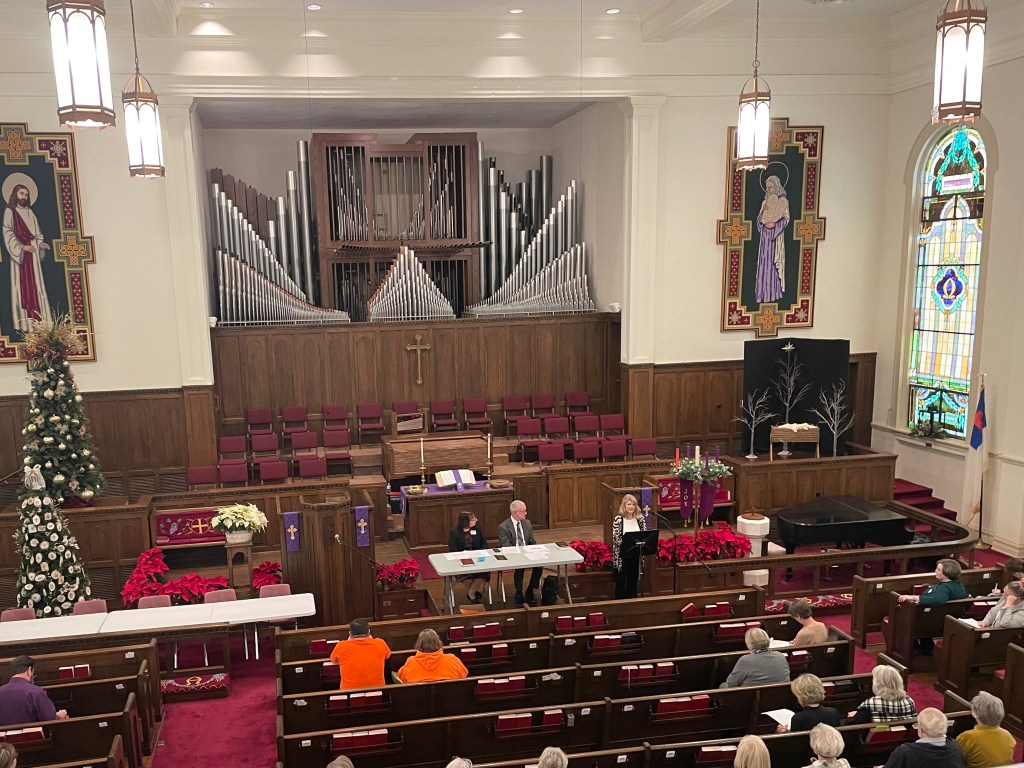I sat in the balcony for a Church Conference on disaffiliation. From the balcony, it hit me that this meeting was being held in the sanctuary. Several speakers went off script and referred to weddings, baptisms, funerals, and regular worship in this sacred space. I began to wonder about the spiritual damage that was being done, knowing that some would be cut off from this rootedness.
From the balcony, I wondered about using the honored word “discernment,” used in this case to describe the pitting of two sides against one another and moving to a vote to divide. True discernment usually looks different, with people willing to suspend judgement, listen, and seek life-giving outcomes – “unity of spirit in the bond of peace.” (Eph 4:1-3).
From the balcony, I wondered about the harm caused by voting. A friend recently pointed out that the only recorded vote in the New Testament was when Pilate asked the people to choose between Jesus and Barabbas (Matt 27:21). The only time the word “vote” is found is where Paul confesses to his vote to condemn Stephen and other Christians to death (Acts 26:10). It is not a glowing endorsement. While voting may be necessary on occasion, especially around organizing for ministry, there are a lot of options before this last resort – conversation, conferencing, catechism, consensus, compromise, and shared calling above all. As we discern and decide, we would do well to remember that the word “party” includes the word “part.” To set up a winner-take-all vote to make a part the whole is…(what’s the right adjective)…so dishonoring of the Body of Christ.
From this particular balcony, the attempts at politeness did not take the sting away from familiar rhetoric. I once again heard isolated examples of statements from professors or un-ordained students as the justification for the harm being caused. I wondered what would happen if we spent our energies, particularly around seminaries, reflecting on the historic questions that have to be answered for ordination. How might we judge theological education if we read the papers of actual students? I get to do this every year and continue to be inspired by how the historic apostolic faith of the church will continue to be passed on from one generation to the next. To this end, it is good that students who are called to serve the church as pastors come in contact with a variety of views in the world.
In this particular case, the vote to disaffiliate failed by a few votes. I was relieved. And then reality set in. As a part of my job, I had to walk down the stairs and into the pain of a divided congregation. It wasn’t long before I overheard conversations about how all the talk of wanting to be a “big tent” – Body of Christ – congregation, rooted in scripture, centered in Christ, and united in the core doctrines of our faith was all a cover for some nefarious agenda. The level of accusation against those who were once friends, and the willingness to trust those working for division, was alarming. I met with those who had worked hard for this outcome, but there was no celebration. People were pleased, but no one was happy. A deep hope, however, remained, — that this would continue to be a congregation that truly believed in the Living Lord who was at work to keep the church as a whole centered in faith, hope, and above all love. That’s what will see us all through.

